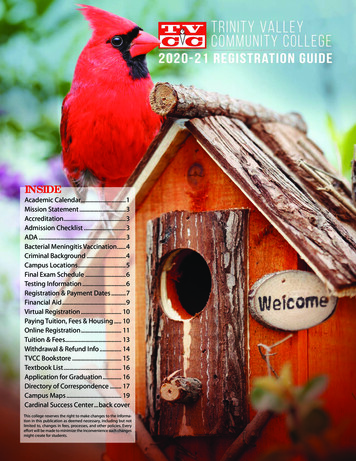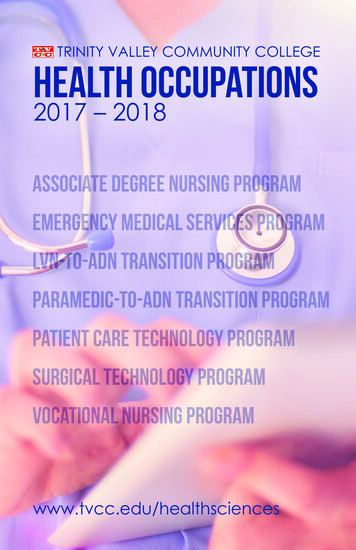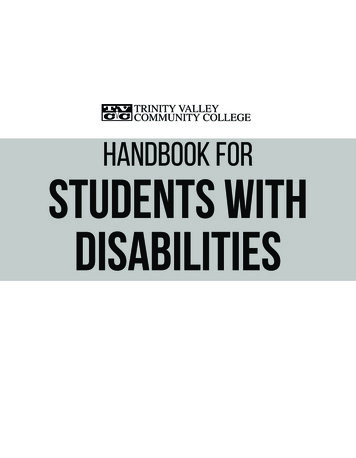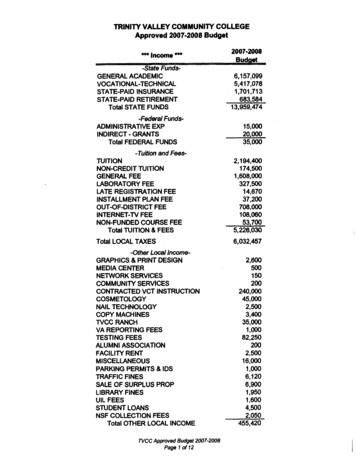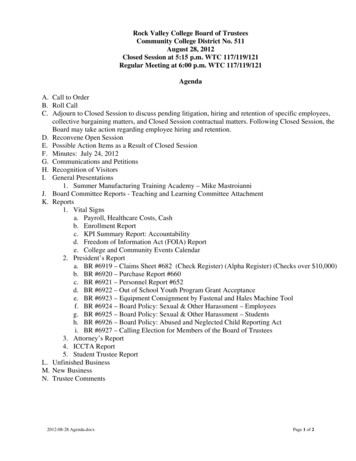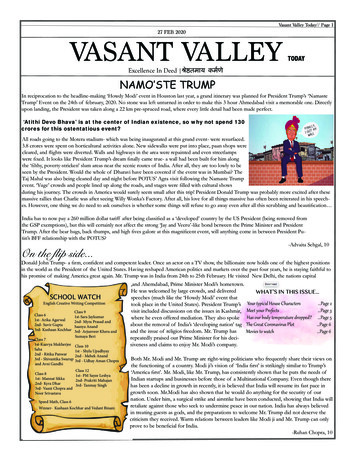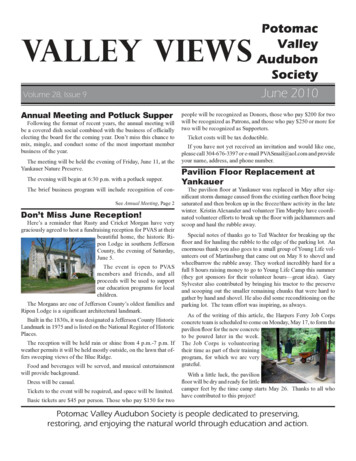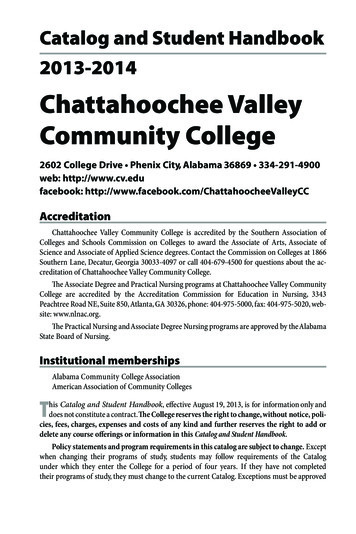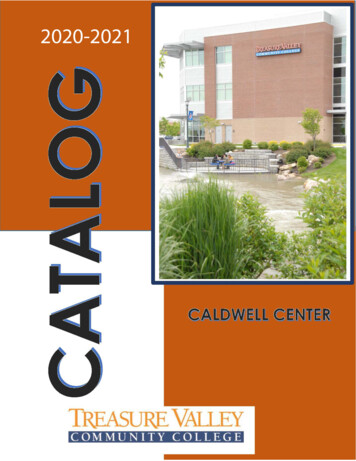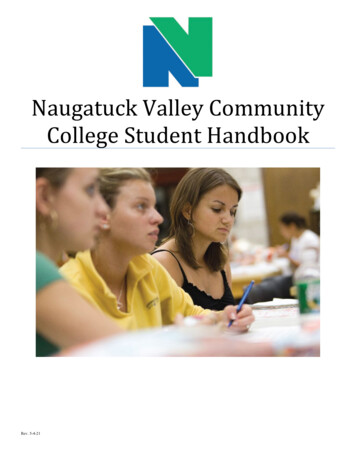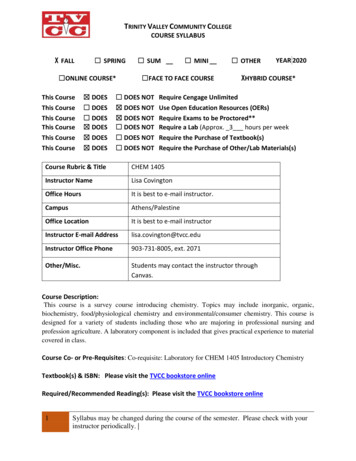
Transcription
TRINITY VALLEY COMMUNITY COLLEGECOURSE SYLLABUSX FALL SPRING ONLINE COURSE*This CourseThis CourseThis CourseThis CourseThis CourseThis Course DOES DOES DOES DOES DOES DOES SUM MINI FACE TO FACE COURSE DOES NOT DOES NOT DOES NOT DOES NOT DOES NOT DOES NOT OTHERYEAR 2020XHYBRID COURSE*Require Cengage UnlimitedUse Open Education Resources (OERs)Require Exams to be Proctored**Require a Lab (Approx. 3 hours per weekRequire the Purchase of Textbook(s)Require the Purchase of Other/Lab Materials(s)Course Rubric & TitleCHEM 1405Instructor NameLisa CovingtonOffice HoursIt is best to e-mail instructor.CampusAthens/PalestineOffice LocationIt is best to e-mail instructorInstructor E-mail Addresslisa.covington@tvcc.eduInstructor Office Phone903-731-8005, ext. 2071Other/Misc.Students may contact the instructor throughCanvas.Course Description:This course is a survey course introducing chemistry. Topics may include inorganic, organic,biochemistry, food/physiological chemistry and environmental/consumer chemistry. This course isdesigned for a variety of students including those who are majoring in professional nursing andprofession agriculture. A laboratory component is included that gives practical experience to materialcovered in class.Course Co- or Pre-Requisites: Co-requisite: Laboratory for CHEM 1405 Introductory ChemistryTextbook(s) & ISBN: Please visit the TVCC bookstore onlineRequired/Recommended Reading(s): Please visit the TVCC bookstore online1Syllabus may be changed during the course of the semester. Please check with yourinstructor periodically.
TRINITY VALLEY COMMUNITY COLLEGECOURSE SYLLABUSRequired Materials: Please visit the TVCC bookstore onlineLearning Outcomes: Upon completion of this course, the student should demonstrate amastery of the following learning outcomes:Chapter 1Understand the importance of learning chemistry.Define chemistry.Understand scientific thinking.Describe the method scientists use to study nature.Develop successful strategies for learning chemistry.Chapter 2Show how very large or very small numbers can be expressed as the product of a number between 1and 10 and a power of 10.Learn the English, metric, and SI systems of measurements.Use the metric system for measuring length, volume, and mass.Understand how uncertainty in a measurement arises.Learn to indicate a measurement’s uncertainty by using significant figures.Learn to determine the number of significant figures in a calculated result.Learn how dimensional analysis can be used to solve various types of problems.Learn the three temperature scales.Learn to convert from one scale to another.Continue to develop problem-solving skills.Define density and its units.Chapter 3Learn about matter and its three states.Learn to distinguish between physical and chemical properties.Learn to distinguish between physical and chemical changes.Understand the definitions of elements and compounds.Learn to distinguish between mixtures and pure substances.Learn two methods of separating mixtures.Chapter 4Learn about the relative abundances of the elements.Learn the names of some elements.Learn the symbols of some elements.Learn about Dalton’s theory of atoms.Understand and illustrate the law of constant composition.Learn how a formula describes a compound’s composition.Learn about the internal parts of an atom.Understand Rutherford’s experiment to characterize the atom’s structure.Understand some important features of subatomic particles. Learn about the terms isotope, atomicnumber, and mass number.Understand the use of the symbol 𝑋 𝑍 𝐴 to describe a given atom.Learn about various features of the periodic table.Learn some of the properties of metals, nonmetals, and metalloids.2Syllabus may be changed during the course of the semester. Please check with yourinstructor periodically.
TRINITY VALLEY COMMUNITY COLLEGECOURSE SYLLABUSLearn the natures of the common elements.Understand the formation of ions from their parent atoms, and learn to name them.Learn how the periodic table can help predict which ion a given element forms.Learn how ions combine to form neutral compounds.Chapter 5Learn two broad classes of binary compounds.Learn to name binary compounds of a metal and a nonmetal.Learn to name binary compounds containing only nonmetals.Review the naming of Type I, Type II, and Type III binary compounds.Learn the names of common polyatomic ions and how to use them in naming compounds.Learn how the anion composition determines the acid’s name.Learn names for common acids.Learn to write the formula of a compound, given its name.Chapter 6Learn the signals that show a chemical reaction has occurred.Learn to identify the characteristics of a chemical reaction and the information given by a chemicalequation.Learn how to write a balanced equation for a chemical reaction.Chapter 7Learn about some of the factors that cause reactions to occur.Learn to identify the solid that forms in a precipitation reaction.Learn to describe reactions in solutions by writing molecular, complete ionic, and net ionicequations.Learn the key characteristics of the reactions between strong acids and strong bases.Learn the general characteristics of a reactions between a metal and a nonmetal.Understand electron transfer as a driving force for a chemical reaction.Learn various classification schemes for reactions.Consider additional classes of chemical reactions.Chapter 8Understand the concept of average mass and explore how counting can be done by weighing.Understand atomic mass and its experimental determination.Understand the mole concept and Avogadro’s numberLearn to convert among moles, mass, and number of atoms in a given sample.Understand how to solve problems by asking a answering a series of questions.Understand the definition of molar mass.Learn to convert between moles and mass of a given sample of a chemical compound.Learn to find the mass percent of a n element in a given compound.Understand the meaning of empirical formulas of compounds.Learn to calculate empirical formulas.Learn to calculate the molecular formula of a compound if given its empirical formula and molarmass.Chapter 9Understand the molecular and mass information given in a balanced equation.Learn to use a balanced equation to determine the relationships between moles of reactants and molesof products.3Syllabus may be changed during the course of the semester. Please check with yourinstructor periodically.
TRINITY VALLEY COMMUNITY COLLEGECOURSE SYLLABUSLearn to relate masses of reactants and products in a chemical reaction.Understand what is meant by the term limiting reactant.Learn to recognize the limiting reactant in a reaction.Learn to use the limiting reactant to do stoichiometric calculations.Learn to calculate actual yield as a percentage of theoretical yield.Chapter 10Understand the general properties of energyUnderstand the concepts of temperature and heat.Consider the direction of energy flow as heat.Understand how energy flow affects internal energy.Understand dhow heat is measured.Consider the heat (enthalpy) of chemical reactions.Understand Hess’s law.See how the quality of energy changes as it is used.Consider the energy resources of our world.Understand energy as a driving force for natural processes.Course Requirements: The course requirements will include online homework (25%), exams (40%),lab assignments (25%), and final exam (10%). Exams will cover 1-2 chapters and the final exam iscomprehensive. A course average of 90% is needed for an A, 80% for a B, 70% for a C, 60% for a D.A grade lower than 50% will have earned an F.Expected Time Requirement for this Course: Approximately 10-15 hours per week of time spentreading, reviewing, and completing assignments is recommended to complete this course.Expected Instructor Response Time Mon-Fri: Students should expect responses to studentinquiries from the instructor within 72 hours Monday-Friday.Expected Instructor Response Time Sat-Sun and holidays: Students should expect responses tostudent inquiries within 72 hours if submitted over the weekend or student holiday. HYBRID AND ONLINE*: Non-Attendance and Financial Aid: If you are receiving financial aid,federal regulations require you to have begun attending the courses for which you are enrolledon or before the census date (e.g., 12th day of each fall and spring semester and 6th day of classeach abbreviated semester). Attendance in an online course is verified by substantialparticipation in the course on or before the census date. TVCC defines substantial participationin online courses as logging in to the online course AND completing/participating in at least onerequirement of the course. NOTE: Logging in to your online course does not warrant“attending”. For this course, you will be required to complete the getting started module and4Syllabus may be changed during the course of the semester. Please check with yourinstructor periodically.
TRINITY VALLEY COMMUNITY COLLEGECOURSE SYLLABUSsafety training before the census (12th class for fall/spring or 6th class day for abbreviatedsemesters) date in order to be marked as “attending” for purposes of financial aid. Studentsdocumented as “not attending” a course upon the census date are assumed (for financial aidpurposes) to have NOT begun attendance for that course, negatively affecting their financial aiddisbursements. FACE TO FACE: Non-Attendance and Financial Aid: If you are receiving financial aid, federalregulations require you to have begun attending the courses for which you are enrolled on orbefore the census date (e.g., 12th day of each fall and spring semester and 6th day of class eachabbreviated semester). Students documented as “not attending” a course upon the census dateare assumed (for financial aid purposes) to have NOT begun attendance for that course,negatively affecting their financial aid disbursement.Attendance in online course at TVCC is verified by students logging in to the course andsubstantially participating in the course on or before the census date. Students documented as“not attending” an online course upon the census date are assumed (for financial aid purposes)to have NOT begun attendance for that course, and this may negatively affect financial aiddisbursements.***PROCTORED TESTING INFORMATION DOES DOES NOT APPLY TO THIS COURSE Proctored Testing Information: If exams must be proctored, describe the options yourstudents; these include taking the exam at a testing center or using a web cam in conjunctionwith the Respondus lockdown browser, utilizing the service offered by Kryterion, etc.) 5Athens – The Testing Center, located in the Administration Building, is open during regular business hours.In the event that the testing center is closed (visit http://www.tvcc.edu/testing/ for scheduled closings),you can test at the LRC. Please visit the Athens testing site to determine the LRC hours of operation andclosures due to class instruction.Palestine – Students are allowed to test at the LRC of the respective satellite campuses. Please visit thePalestine testing site to determine their hours of operation. NOTE: You MUST arrive at the testing center(s)at least 1 hour prior to closing so that you COMPLETE your testing before they close.Terrell – Students are allowed to test at the A101computer lab during designated hours. Please visit theTerrell testing site to determine their hours of operation. NOTE: You MUST arrive at the testing center(s)at least 1 hour prior to closing so that you COMPLETE your testing before they close.Syllabus may be changed during the course of the semester. Please check with yourinstructor periodically.
TRINITY VALLEY COMMUNITY COLLEGECOURSE SYLLABUSOutline of Course Schedule: The following is a tentative schedule and is subject to change. Anychanges will be noted in the announcements and well in advance of due dates.Week 1. Getting started module and Chapter 1 Module/Lab SafetyWeek 2. Chapter 1 and 2 Modules/Lab 1Week 3. Chapter 3 Module/Lab 2Week 4. Chapter 4 Module/Lab 3Week 5. Chapter 5 Module/Lab 4Week 6. Chapter 6 Module/Lab 5Week 7. Chapter 7 Module/Lab 6Week 8. Chapter 7 Module continued/Lab 7Week 9. Spring BreakWeek 10. Chapter 8 Module/Lab 8Week 11. Chapter 8 Module continued /Lab 9Week 12. Chapter 9 Module/Lab 10Week 13. Chapter 9 Module continued/Lab 11Week 14. Chapter 10 Module/Lab 12Week 15. Review for FinalWeek 16. Final ExamClassroom Policies: This class meets online, as such there is no make-up work. If any assignment ismissed you will receive a zero. It is expected that students act in a professional manner and follow allinstructions. Any variance from this and the student may be dismissed/dropped from the class. Do not getbehind on your reading.Late assignments: Generally late assignments will NOT be accepted; however, I will make exceptionsdepending on the situation.Cheating/Plagiarism: Scholastic dishonesty shall include, but not be limited to, cheating on atest, plagiarism, and collusion. “Cheating on a test” shall include 6Copying from another student’s test paperUsing test materials not authorized by the person administering the testCollaborating with or seeking aid from another student during a test without permission from thetest administrator – NOTE: an instructor using non-proctored exams is NOT providing permissionto collaborate with or seek aid from another student.Knowingly using, buying, selling, stealing, or soliciting, in whole or in part, the contents of an unadministered testThe unauthorized transporting or removal, in whole or in part, of the contents of the unadministered testSyllabus may be changed during the course of the semester. Please check with yourinstructor periodically.
TRINITY VALLEY COMMUNITY COLLEGECOURSE SYLLABUS Substituting for another student, or permitting another student to substitute for oneself, to take atest, andBringing another person to obtain an un-administered test or information about an unadministered test.Accessing web content or online resources to provide support in answering questions on exams,proctored or not“Plagiarism” shall be defined as the appropriating, buying, receiving as a gift, or obtaining by anymeans another’s work and the unacknowledged submission or incorporation of it in one’s ownwritten work. “Collusion” shall be defined as the unauthorized collaboration with another personin preparing written work for fulfillment of course requirements.The punishment for cheating or collusion in this class is a failing grade on that particularassignment or dismissal from class. Dismissal will result in a failing grade. The student may receivean F for the entire course (laboratory and lecture) if the misconduct is severe.Drop Policy: It is your responsibility to drop a course. I may drop a student for nonattendance. Imay, at my discretion, drop a student if their behavior is disruptive to the learning environment.A student may withdraw (drop) from a course and receive a grade of “W” at any time during agiven semester subject to the last day to receive a “W” deadline specified in the TVCC scheduleor catalog.Additional Information: You should develop a backup plan should your computer system or yourInternet provider fail. Computer or internet connectivity issues are not valid excuses for missinga deadline. The college provides many opportunities for using computer equipment as do manypublic librariesAdvocacy Information: Any student who faces challenges securing their food or housing and believes thismay affect their performance in the course is encouraged to contact the advising office for guidance onhow to identify possible resources. Please notify the instructor of your circumstance if you arecomfortable doing so.Affirmative Action: TVCC is an affirmative action/equal opportunity institution which provideseducational and employment opportunities on the basis of merit and without discrimination orharassment in full compliance with the Civil Rights Act of 1964, as amended; the Rehabilitation Act of 1973(Section 503,504); Americans with Disabilities Act, as amended, Title IX of the Educational Amendments7Syllabus may be changed during the course of the semester. Please check with yourinstructor periodically.
TRINITY VALLEY COMMUNITY COLLEGECOURSE SYLLABUSof 1972; the Vietnam Era Veterans Assistance Act of 1974; Article 522lk V.A.C.S.; and Executive Orders11246 and 11758.American with Disabilities Act (ADA): Trinity Valley Community College provides equal opportunities foracademically qualified students with disabilities and ensures access to a wide variety of resources andprograms. The passage of Section 504, Federal Rehabilitation Act of 1973, and the Americans withDisabilities Act of 1990 requires that the college make certain special arrangements for students withdisabilities such as moving classes to accessible locations when necessary, allowing the use of taperecorders, sign language interpreters, or other educational auxiliary aids, making special testarrangements, and other accommodations. The college will make reasonable accommodations forqualified students with a diagnosed physical and/or learning disability who have been admitted to thecollege and request accommodations.Students with disabilities who wish to request accommodations should notify the Disability Services Officeon their campus. In accordance with federal law, a student requesting accommodations must providedocumentation of his/her disability to the Disability Services counselor. For more information, please visitthe Disability Service Office on your campus or contact Melinda Berry at 903-675-6224 and emaildisability@tvcc.edu.Campus Carry: The College District prohibits the use, possession, or display of a firearm on College Districtproperty or at a College District-sponsored or -related activity in violation of law and College Districtregulations. This policy does not apply to commissioned peace officers in accordance with law. All persons,including license holders, are prohibited from openly carrying a handgun on all College District campusesand premises. License holders may carry a concealed handgun on or about their person while on CollegeDistrict campuses and premises. License holders are responsible for complying with applicable federal andstate law and this policy and associated regulations.Criminal History: TVCC awards some certificates and degrees in which a criminal history MAY disqualifycandidates from becoming licensed upon degree/certificate completion. Students with a criminalbackground enrolling in courses leading to a degree/certificate in criminal justice, cosmetology, nailtechnician, Heating/Ventilation/Air Conditioning (HVAC), Emergency Medical Technology (EMT), NurseAide, Vocational Nursing (VN), Associate Degree Nursing (ADN), Surgical Technology, Patient CareTechnology, or Pharmacy Technician program are STRONGLY ENCOURAGED to discuss the licensingregulations with the TVCC program director listed in the current catalog and learn about the currentguidelines related to criminal history as well as the right of individuals to request a criminal historyevaluation letter.Electronic communication: TVCC students are REQUIRED to use either their TVCC Canvas account or theirTVCC email account for all electronic communication. In order to ensure the identity of the studentcommunicating via electronic methods, TVCC faculty will not reply to student communication that is sentthrough an email account other than their TVCC issued email account or Canvas account.8Syllabus may be changed during the course of the semester. Please check with yourinstructor periodically.
TRINITY VALLEY COMMUNITY COLLEGECOURSE SYLLABUSLogging on to E-Courses: To access your online courses, visit https://ecourses.tvcc.edu. Use your CardinalID and Cardinal Password to log in. If you are unsure of your Cardinal ID, visithttps://webapps.tvcc.edu/GetIDs1/. TVCC Password guidelines are set as follows:Low
each abbreviated semester). Attendance in an online course is verified by substantial participation in the course on or before the census date. TVCC defines substantial participation in online courses as logging in to the online course AND completing
